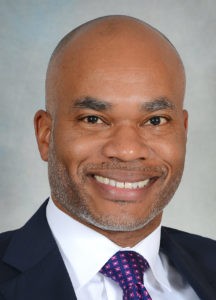What does it mean to be a Christian citizen? The question should challenge every breath in our bodies in the way George Floyd and Breonna Taylor and many other Black Christian citizens died daring to breathe. There is no dodging this question of Christian citizenship amid a pandemic of many things — inadequate health care, poverty, COVID-19 and racism.

Darryl Warren Aaron
In a recent New York Times column, David Brooks was heavy handed with his opinion as to what happens during a pandemic. He wrote, “Some disasters, like hurricanes and earthquakes, can bring people together, but if history is any judge, pandemics generally drive them apart.” In other words, pandemics kill who we were meant to be, compassionate and community-oriented people.
Howard Thurman wrote in his classic book The Inward Journey: “It is a strange freedom to be adrift in the world of men without a sense of anchor anywhere. Always there is the need of mooring, the need for the firm grip on something that is rooted and will not give. The urge to be accountable to someone, to know that beyond the individual himself there is an answer that must be given, cannot be denied. The deeds a man performs must be weighed in a balance held by another’s hand.”
“More than ever, we must be accountable to each other and know that our actions will be judged.”
During pandemics and political upheavals, probably more than ever, we must be accountable to each other and know that our actions will be judged.
We cannot simply do what we want with our lives; we are to live by the order of the divine.
James Baldwin, writer and civil rights activist, tells about his early years of being adrift as a Black boy in Harlem in the 1960s. In the midst of pimps and whores, Baldwin could see that many of his friends were “headed for the Avenue.” When Baldwin was asked by a female pastor, “Whose little boy are you?”— the same words used by the pimps and whores — Baldwin knew he wanted to be somebody’s little boy. Having been raised in a Christian home, Baldwin knew something about Paul’s admonishment in his letter to the Ephesians when he wrote, “so that we may no longer be children tossed to and fro and carried with every wind of doctrine.” Deep down, in the recesses of our beings, we all must know, like James Baldwin, we are somebody’s little boy or girl! We have been claimed by God and called by God.
There is no way around the fact that the coronavirus is a powerful disease that seeks an entitlement to every facet of our lives. And to state the obvious, there is no such thing as being politically neutral. Yet neither pandemics nor a controversial presidential election can impair the identity we have in Christ. We cannot let existential threats toss us to and fro and carry us from the foundations of what we know to be true.
“While the pandemic has loosened many ideas and beliefs that appeared securely bolted, the underpinning of what is true remains.”
While the pandemic has loosened many ideas and beliefs that appeared securely bolted, the underpinning of what is true remains. Right now, we need to trust and believe we are somebody’s little boy and girl. This is not the first time we have experienced a zeitgeist — a defining mood in history.
Songs, like the old Negro spiritual, “Somebody’s calling my name. Oh, my Lord, what shall I do,” nurtured Blacks in America enduring the divisive and debilitating disease of segregation. Many years after Rosa Parks’ courageous act, she was asked why she refused to move to the back of the bus. Legend has it that she didn’t say she sat down to launch a movement because her motives were more basic than that. Rosa said, “I sat down because I was tired.”
She did not mean her feet were tired; instead, she meant her soul was tired, her heart was tired, and her whole being was tired of being claimed by the racist plague that denied her soul’s claim to selfhood. Rosa Parks had grown up in the South under the demeaning and degrading hand of Jim Crow laws. In a place that denied Blacks their God-given rights, Rosa Parks continued to hear a voice from within that told her she was somebody.
In Montgomery, Ala., riding buses where Blacks were demanded by law to stand while whites sat, Rosa Parks found her place to answer the questions: What shall I do? What does it mean to be a Christian citizen?
“Somebody’s calling my name … what shall I do” is an ethical echo and the imperative whisper that must be heard by God’s people in times like these. May Christian citizens like Rosa Parks find a seat where we can rest assured that we belong to Somebody, the God of all creation.
Darryl Warren Aaron is pastor of the historic Providence Baptist Church in Greensboro, N.C. His prophetic voice has been heard within the Cooperative Baptist Fellowship, Alliance of Baptists, New Baptist Covenant, General Baptist State Convention, and Ellison-Jones Convocation. A native of Charlotte N.C, he earned a degree in dramatic literature at North Carolina Central University and the master of divinity degree at the Samuel Dewitt Proctor School of Theology at Virginia Union University. He earned the doctor of ministry degree from Drew University.
This column is part of an election year series being published by Central Baptist Theological Seminary on the seminary’s website. It is shared by permission with BNG.
